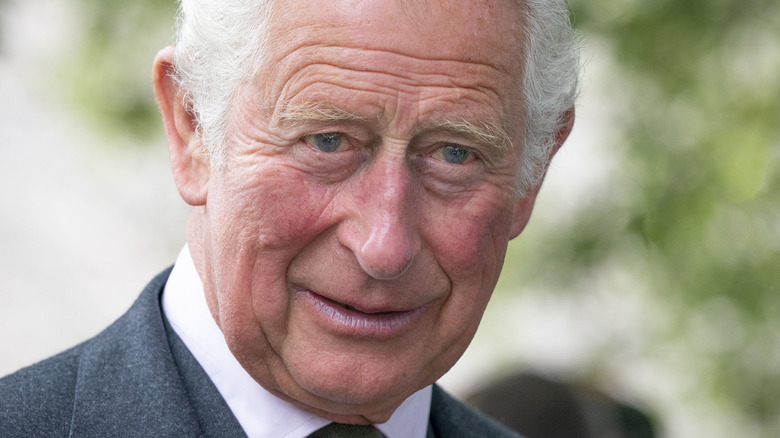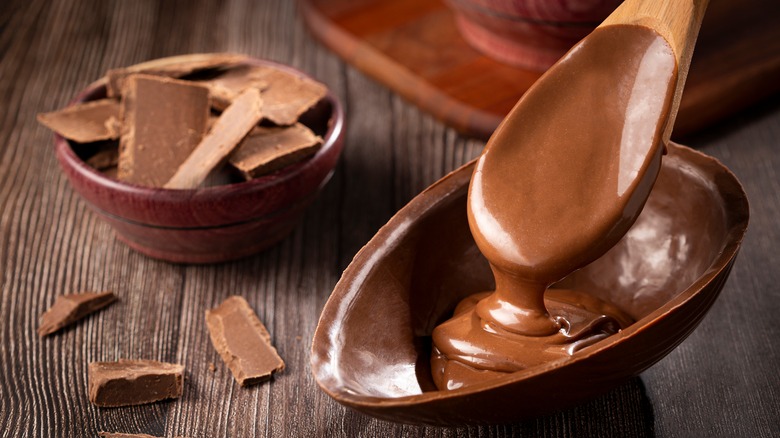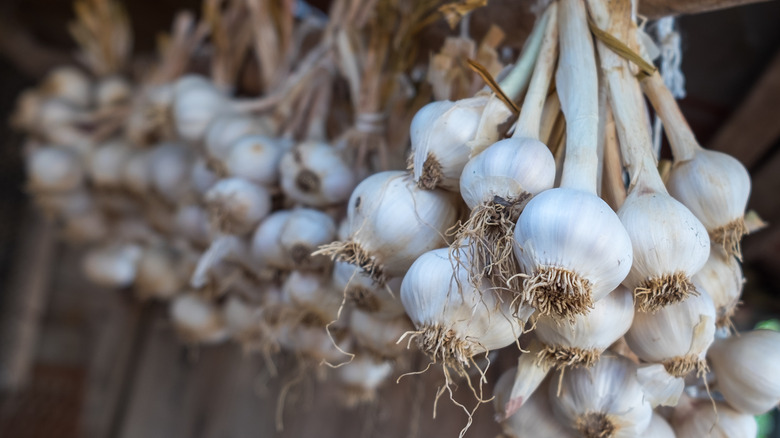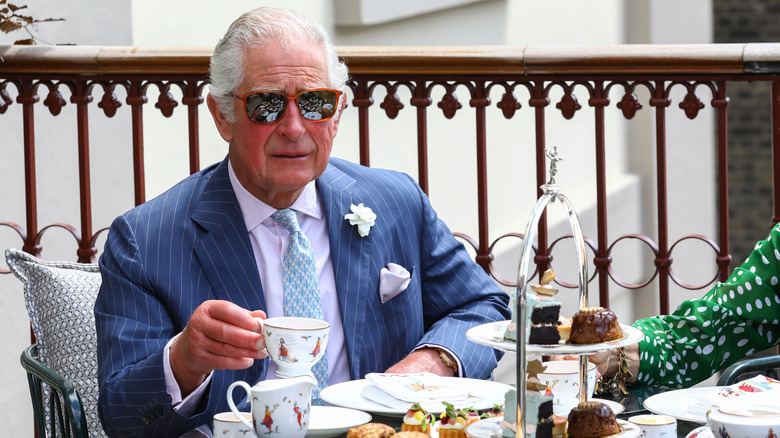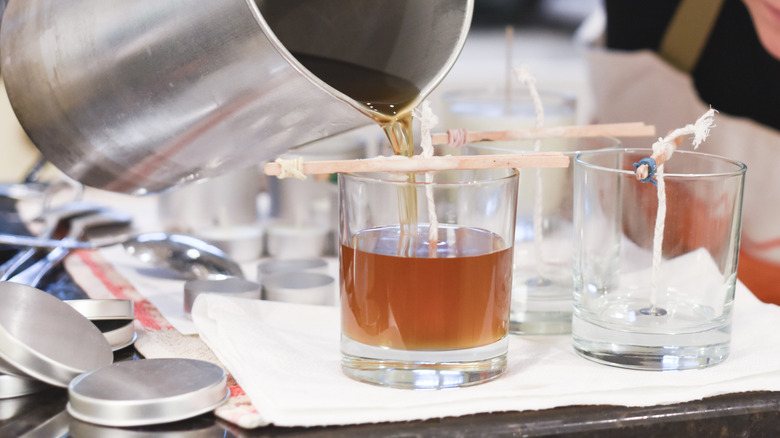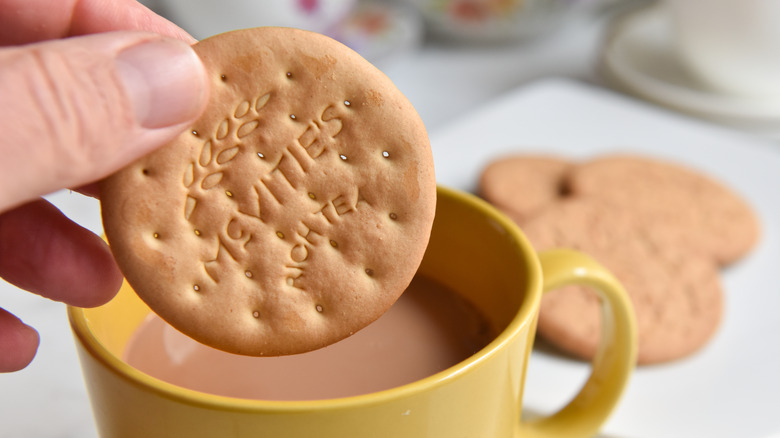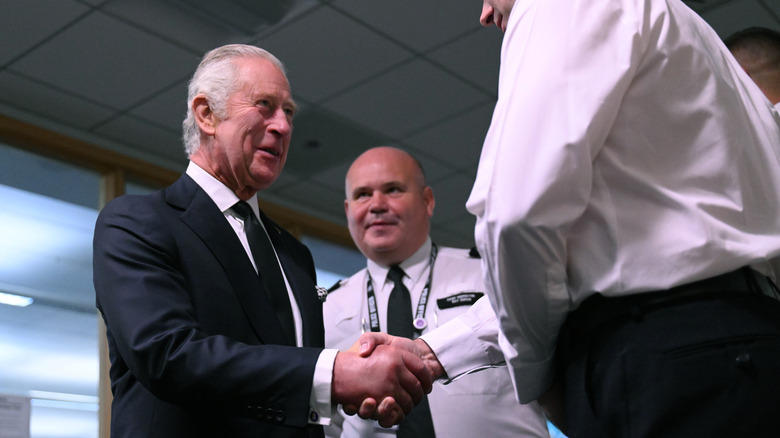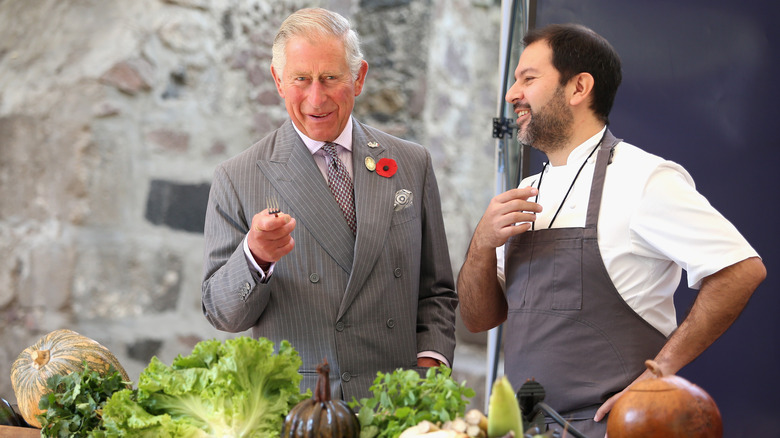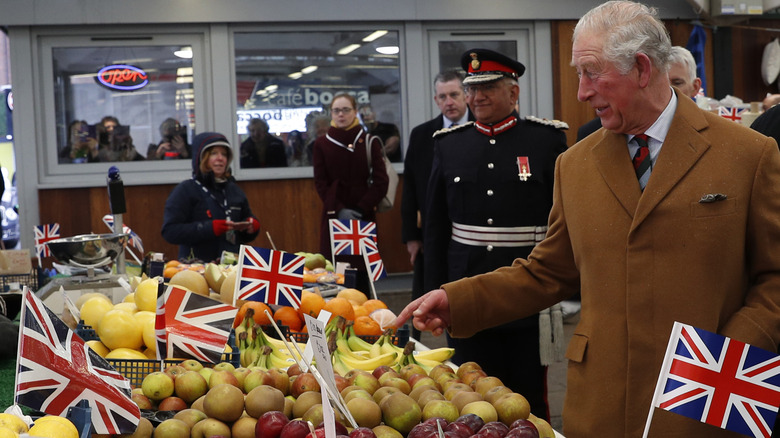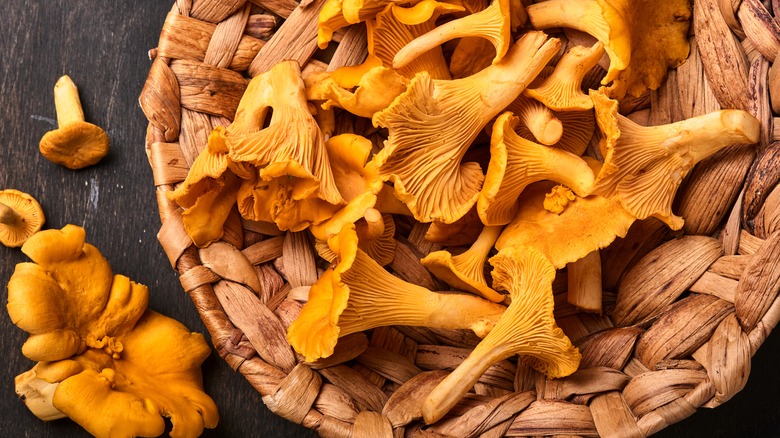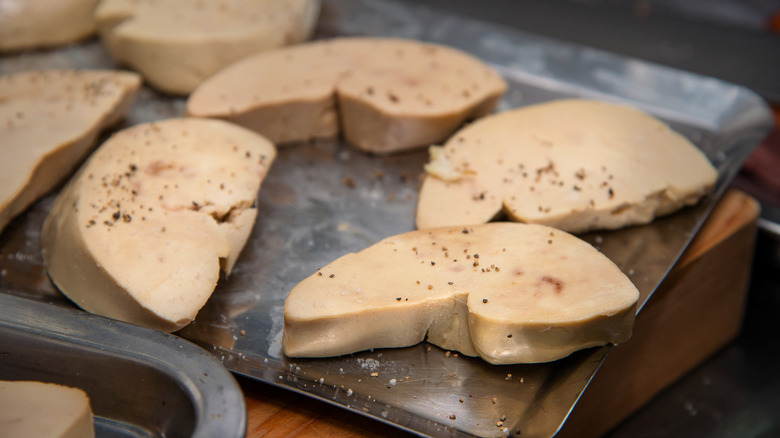Foods King Charles Refuses To Eat
When you're born into a royal family, many aspects of life are different from the average person, though King Charles III is much like all of us when it comes to meals. Charles has foods he eats almost daily, and there are others that he will not eat. Fortunately for him, he isn't forced to eat anything because, as they say, it's good to be king.
Throughout British history, various monarchs had their quirks, gastronomical or otherwise. While King Henry VIII was annulling marriages or his executioner was busy lopping off his wives' heads (via History), the monarch could be found slicing into cockentrice. South China Morning Post describes this culinary oddity as "a 'mythical beast' featuring a pig and capon [rooster] sewn together" and notes that fish fry Fridays at Henry's often featured whale or porpoise. In the 18th century, King George II preferred puffins, larks, and various songbirds that were only days old (via NPR). Considering those comparisons, Charles' odd eating habits and the foods he refuses to eat are actually pretty tame.
Charles doesn't like chocolate — yes, chocolate
The late Queen Elizabeth II had such a love for all things chocolate that she reportedly had a go-to London chocolatier providing exclusive chocolates to the royal family (via The Independent). One royal family member apparently isn't into this sweet perk. Former Welsh Culinary Team manager, Graham Tinsley MBE, says that King Charles III "doesn't like chocolate..." (via Hello!).
Perhaps even more shocking is the fact that this royal chocolatier, Charbonnel et Walker, has roots that trace back to 19th-century France. When King Edward VII was on the British throne, his favorite chocolate treat came from Madam Charbonnel in Paris. The 19th-century monarch convinced the chocolatier to open a shop in London's well-heeled Bond Street shopping area. Today, you can buy a box of treats from this royal chocolatier, but it'll cost you a hefty ransom of £280.
The fact that the current monarch doesn't like chocolate is generally in line with British sentiment, which definitely contrasts America's taste for the confection. According to data from Statista, the United States is a chocolate-loving nation. While they aren't the nation that consumes the most chocolate, Americans consumed more than 1.5 million tons of chocolate in 2020, while the United Kingdom consumed just 760,000 tons.
Royal duties and garlic breath just don't mix
It's unclear whether or not King Charles likes the taste of garlic, but the face-to-face nature of his role means it's best to avoid what some people lovingly call "dragon breath." When asked by MasterChef Australia in 2018 about foods you won't find at royal events, Queen Consort Camilla Parker Bowles said, "I hate to say this, but garlic. ... Garlic is a no-no."
When your job is as the head of state, it means a lot of close contact with influential people, so avoiding garlic seems to be a sensible sacrifice. It's not just garlic breath the king has to worry about. When we eat food, our digestive system breaks it down into tiny molecules that are also emitted from the breath and skin (via Boston.com). Garlic's odor is more potent than many other foods, so even a mouthful of breath mints and an N95 mask wouldn't prevent it from wafting out of Charles' skin after eating it.
If you happen to be a garlic lover and are worried about emanating garlic odors, eating certain foods alongside it may neutralize the pungent bulb's odor compounds. According to a 2017 Journal of Food Science, apples, mint, and lettuce were all very effective at battling "eau de garlic."
Naturally, Charles drinks tea and not coffee
As British colonists, Americans used to prefer tea over coffee. But a little event in Boston Harbor back in 1773 sparked America's love affair with coffee (via Golden Moon Tea), and Great Britain's current monarch has yet to follow suit. King Charles III does not enjoy a strong cup of joe, and this is just one of several dietary considerations that royal culinary teams have to consider (via Hello!).
While Brits are world-renowned for their tea consumption, they are increasingly becoming a nation of coffee drinkers. According to data from the Centre for Economics and Business Research, daily coffee consumption in the U.K. increased nearly 35% over 10 years, from 70 million in 2008 to 95 million in 2018. That still lags far behind that of Americans. Research from Roast and Pound notes that the average Brit drinks two cups of coffee per day, while the typical American drinks three.
Tea for King Charles III must be specifically prepared
British people take their tea very seriously, so it only makes sense that the king would be quite particular about his own tea. When it comes to making tea, there are rules for each type of tea, different kinds of sweeteners, and even the placement of the teacup handle and spoon.
In an interview with British Heritage, royal hospitality manager Evan Samson said the most important part of King Charles III's tea service is the use of loose-leaf tea. For the king, each teapot is brewed using one teaspoon of tea leaves per teacup, with an extra teaspoon added for more flavor. Green tea must be brewed for three minutes in water heated to 70 C (158 F), while Earl Grey and English breakfast teas are brewed for five minutes in 100 C (212 F) water. No matter the kind of tea, a thermometer is always used to confirm the water temperature.
Charles' mother, the late Queen Elizabeth II, was also known for liking her tea in a specific way. Former royal butler Grant Harold told British Heritage the precise instructions he received: "Pour the tea into the cup from a teapot, add milk to the cup after the tea and never before, stir back and forth, never use a circular motion and never touch the sides."
The king refuses to eat biscuit cookies that aren't prewarmed
Do you eat biscuit cookies without heating them first? If not, then you've been doing it wrong, according to King Charles III. The new king is such a fan of the crispy cookies called "biscuits" in England that he actually has his own brand: Waitrose Duchy Organic. Merged with the British supermarket chain Waitrose in 2009, the Duchy Originals brand was founded by then-Prince Charles in 1990 and designed to support sustainable farming practices (via CNN).
According to Waitrose & Partners, the initial Duchy products were made using potatoes, butter, and grain from the royal Cotswolds estate. The recipe for the brand's original oaten biscuit was in development for over a year, likely with input from the now-king. According to NPR, "The cookie is much more refined than it sounds, and it hit the spot with tea and cheese when we tried it." Whether or not you go for the royal brand, when traveling, biscuits are one of the best foods to pick up in London.
Clearly, biscuits are a big deal to King Charles III. According to MyLondon, he often prefers cheese and warm biscuits after meals. Cold biscuits simply will not do, so his "staff keeps a warming pan just to make sure they are hot enough for his liking."
Charles refuses to eat any food at lunchtime
Whether it's to stay fit or get as much done during the day as possible, King Charles III refuses to eat lunch. According to a report in the Mirror, King Charles starts his day with a breakfast of seasonal fruits, seeds, and tea and works on the royal family's various charity endeavors throughout the day. While he does not stop for lunch, Charles will take a midday break to go for a walk and get some fresh air. He does not eat again until 5 p.m. teatime, during which he usually has sandwiches, fruit cake, and tea. The king wraps up his eating for the day with an 8:30 p.m. dinner and typically doesn't go to bed until after midnight.
Given the rising popularity of intermittent fasting as a personal health choice (per Philadelphia Magazine), it may seem like skipping lunch is a good way for Charles to stay in shape. However, this may not be beneficial for one's health. A study in the journal Public Health Nutrition found that while skipping meals does result in less calorie intake, it also leads to lower diet quality because it reduces the variety of foods needed for a balanced diet.
The king abstains weekly from both meat and dairy
To his credit, King Charles III is dedicated to supporting sustainability, and as part of that commitment, he abstains from meat and dairy on a weekly basis. Speaking with BBC Breakfast in 2021, then-Prince Charles said he doesn't eat "meat and fish on two days a week, and I don't eat dairy products on one day a week." If more people did the same thing, Charles said, it would "reduce a lot of the pressure on the environment." There are also many health benefits of a vegan diet.
So is avoiding animal products (often referred to as veganism) a good thing for the environment? According to the United Nations, the meat and dairy industries are responsible for more than 14% of our greenhouse gas emissions. A 2016 study published in the Proceedings of the National Academy of Sciences journal said food-related emissions would fall 70% by 2050 if we all went vegan.
However, a plant-based diet can still be less-than-ideal for the environment, depending on what's included in a person's diet. Almond milk is more environmentally friendly than dairy milk, but it still requires 74 liters of water to produce a single glass, while rising demand for avocados has led to illegal deforestation in Mexico (via BBC Good Food). With those facts in mind, if Charles did source his plant-based food from the royal gardens, his vegan meals are likely far more sustainable than meat and dairy products.
Out-of-season food is out of the question
Going all the way back to his marriage to Princess Diana, Charles has taken a farm-to-table mentality to his diet, and when you own many different rural properties, farm-to-table means from your farm to your table. According to an interview in The Sunday Times with former royal chef Carolyn Robb, Charles demands that his meals are made with seasonal ingredients, ideally from his many gardens. Robb told the Times: "In asparagus season, I might serve it three or four times a week. You wouldn't dare serve asparagus or strawberries in December."
Eating seasonally is all well and good in warm weather months, but what about during the winter? Several crops can be grown in cold weather, such as parsnips, squash, collards, and Brussels sprouts (via CBS News). Canning, fermenting, pickling, and preserving are also used to extend the availability of warm-weather produce.
You don't have to be the king of England to reap the benefits of canning your food. The method of preservation is a good way to be more self-sufficient, save some money, reduce food waste, and enjoy a meaningful hobby.
King Charles is a mushroom snob
King Charles is well known for being way into mushrooms. In fact, when former prime minister Tony Blair was asked by New York magazine for a word he associated with the current monarch, his answer was "mushrooms." Blair said that when he was prime minister, Charles once took him on a tour of Balmoral and pointed out which mushrooms were edible and which ones weren't.
It turns out that Blair hasn't been the only one getting a mushroom-oriented tour of Balmoral. In a Delish video, former royal chef Darren McGrady recounts that Charles invited a mushroom expert to take his chefs around the Scottish castle grounds and show them where to find the best wild mushrooms. According to Delish, McGrady said, "We brought them back to Buckingham Palace, and they were the most amazing porcini mushrooms."
In keeping with Charles' desire to eat sustainably, McGrady and his chefs cooked the mushrooms in butter and tarragon and froze them for use throughout the year. Those fantastic fungi may have been used to make one of the king's favorite dishes, rack of lamb with wild mushroom risotto.
Foie gras is banned from the royal kitchen
While his predecessor King Henry VIII may have feasted on the entrails of whale and porpoise as a Friday night dinner special, King Charles III refuses to eat foie gras due to ethical concerns. Made by force-feeding a duck or goose, foie gras is a controversial food item that has been banned in several countries. PETA is one of the biggest critics of foie gras, arguing that the production process is unsanitary and causes the birds to become lethargic due to overeating.
It's hard to believe that anyone would make a case for force-feeding an animal. However, defenders of foie gras say producing it isn't much different than the overfeeding that occurs at factory farms, which we generally accept as a society. In fact, foie gras is often made on small farms using free-range birds. Prominent food writer J. Kenji Lopez-Alt has argued that some foie gras comes from ducks treated better than the average livestock destined for the slaughterhouse (via Wall Street Journal).
